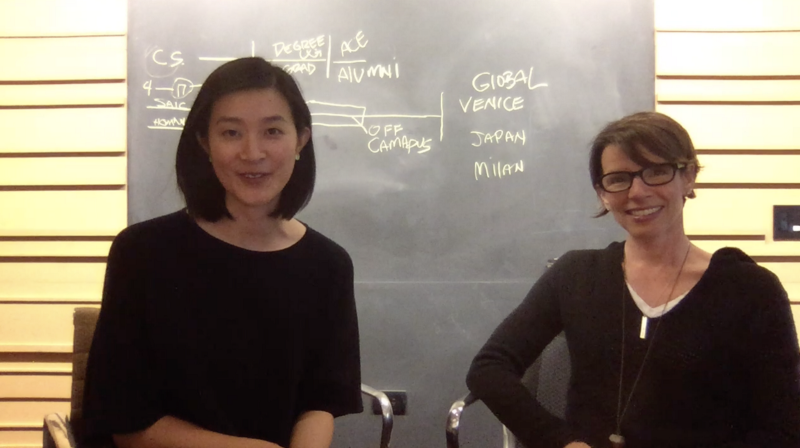As the founder + CEO of a 100+ person remote company, Sara reveals the importance of gut instinct in leadership, and how she learned that the hard way when starting her first company at 21 years old.
Claire: Hi, everyone. My name is Claire Lew, and I’m the CEO of Know Your Company and today I have a really special guest. I have Sara Sutton Fell, who is the CEO and founder of FlexJobs, an incredible resource for folks who are looking for remote work, as well as she’s the founder of Remote.co, which is another incredible resource for remote work.
Sara is someone who I met at a conference, I would say, just back in September, that she helped organize, and that I spoke at. It’s been incredible to hear the company she’s run for the past ten years, having grown it to 100 people. There’s just a lot to be learned from you. Thank you for being here.
Sara: Thank you for having me. It’s great to be in Chicago.
Claire: Yeah, Sara is actually in from Colorado on this very snowy day. We’re very happy she could make it.
Sara: No flight delays, yay.
Claire: Sara, there’s this one question that I want to ask you that I’ve been asking a lot of leaders who I respect which is:
What’s something you wish you would have learned earlier as a leader?
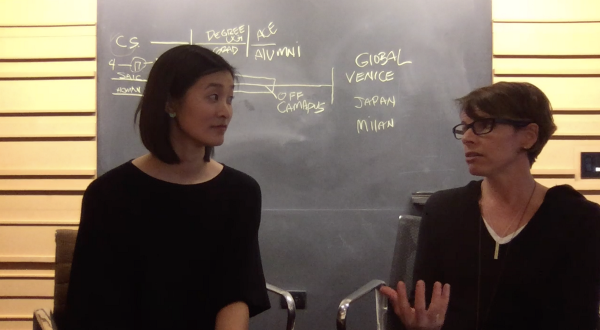
Sara: There are a lot of different areas I can answer that because I think there’s a lot of things I wish I knew earlier or sooner. One of the concepts that comes back around for me, I’ve probably embraced the most, is listening to your gut instinct. It’s something that for me, I dropped out of college to start my first company with a friend. We were two women who did not have business experience. It was a passion idea. We created the first online entry level job database.
Claire: How old were you at the time?
Sara: We were 21. We dropped out. We convinced our parents to have a semester off. We were going to try this crazy idea. It was right when the internet was coming out. It was ’95. It was pretty early in terms of getting it adopted. I went to Berkeley and it was one of those times where you still couldn’t get email addresses readily. It was really pretty early.
We loved this idea. She was going to be a teacher, I was going into international relations. Neither of us had business backgrounds. When we dove in, we dove in whole heartedly. We tried to teach ourselves everything we could. We read business books. We were just diving in and getting, starting to raise money and all of these different areas. The internet culture and this youth entrepreneurship movement really hadn’t started. It was pretty new.
We were young. We had a lot of people telling us we had a great idea, but you have to do it this way or this way or this way. We saw a different way in many of the cases. I’m keen on learning, so I love listening. We knew we weren’t business experts. We were coming into this as first time entrepreneurs. We probably took people’s advice against our own instinct much more often than we should have.
I know that when I looked back after selling the company at the things I would have changed or what I wish I … Is there anything I wish I had done differently?
I’m not a big believer in the concept of regret, but I do like to reflect and look at what I could have learned and where was that moment. Those moments of inflection where you can see what happened if you had done it differently.More often than not, almost all the big ones were times where I had a gut instinct on something that I could back it up with competitive research or with data or whatever.
Claire: It’s not like you were just dreaming something.
Sara: Right, but it went against somebody else’s opinion or in that case many traditional business approaches. I’ve looked at that and I’ve embraced it throughout my career since then a little bit more. Certainly in my second company, I’ve been able to own it a lot better and to listen to that gut balancing it out with having some really important data points and research.
I believe in due diligence, but it’s something and the sensibility of the ideas, but gut instinct is something that’s very valuable. You can’t learn it. With an MBA, you can’t learn your gut instinct. It’s like a really valuable tool definitely.
Claire: I feel like I’m sitting here nodding my head because I’m like, “Oh yeah.” I struggled with listening to my gut I think my entire career as an entrepreneur, as a founder. It’s incredibly difficult. It’s something to this day I still know that that’s very vital. It’s refreshing to hear you share that that’s something that you’ve similarly gone through. I’m curious. When do you know? I think sometimes I’ve been in situations where all the ideas sound good. I do have a gut feeling about one of them, but how do you know when to listen and when to be humble and take it and learn and maybe go a different way?
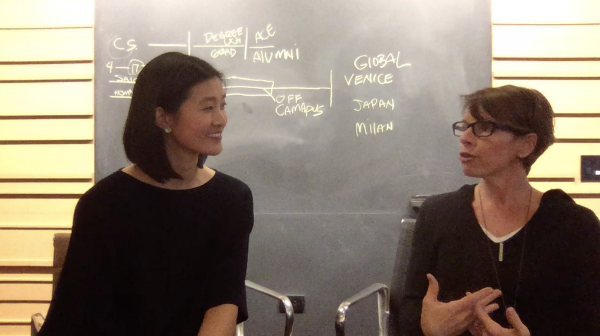
Sara: I feel like for me, there’s probably two main situations and then some in between. Sometimes there are situations where you just really believe in something and it might not make sense, but you really feel like it’s right. You have a real strong sense about it. You might not be able to make it defensible from all of the data points at this point and you need people to have a little fail. You’re having little fail. It’s something about your experience and where you are at that time and place has given you this insight that it’s good to listen to it.
I think depending on the type of leader you are, generally if you have a team behind you, people you’re working with, investors, or what have you, you’ve earned it a little bit. They trust you. You’re the leader for a reason. I think you can’t tap into that all the time. You have to see those moments, but if people can trust you to make these leaps and have that vision and support you even if they don’t totally see it yet, I think it’s a wonderful thing. That’s vision. It’s innovation. It’s at the core of a lot of really huge forward thinking and successful ideas and businesses.
Again, you can’t do it all the time. The rest of the time, I really focus on defensibility of ideas. Not only for myself, but also my team. I might have an idea that I really look at what can back it up and making sure that does it make sense for the company now? I might have an idea that I love and I think is going to be great, we definitely are going to have to do it, but now might not actually be a good time.
In our first company, we had people coming to us with ideas all the time. We had no shortage of ideas as any healthy company does not have a shortage of good ideas, but it’s about when, when to execute them. Is this the right time? Do we have the right resources? We finally tacked up a piece of paper on the wall and I think in crayon had written, or market or something, crazy ideas. Somebody would come to our desk and we’d be talking about this idea and we’d be like, “Put it on the wall.”
We would go through that. We left it on the wall and we’d go through it sometimes. We’d be like, “Oh, it didn’t work then, but actually let’s try that now.”
There are sometimes that even when yourself when you have a gut instinct on something that you have to give it some space to breath. It might not be now, but it’s something that I really believe in not losing those ideas or those kinds of things. I like to write them down or keep them somewhere where I can revisit and put together the pieces of the puzzle that will support it.
Claire: I think this idea of listening to your gut instinct, not being in opposition of putting something on hold or listening to it later in the timing of it, I love that you can do both and that listening to your gut doesn’t always mean just doing it right in the moment.
Also what I thought was really interesting, is you use the word “defensibility “which I think a lot of people, they don’t associate with gut instinct. It’s one or the other. You can either deny it and state a case, or you listen to your own little crazy inner voice. You’re saying no, they’re actually very complimentary and they should be used very much together. I think that’s really wonderful.
Another thing I was thinking about too is again just personally reflecting on how I have always tried to find ways of how do I get better at listening to my gut is a lot of times there have been moments where I do not listen to my gut because I’m scared of it not working out. The difference between listening to your gut … Sorry, the difference between going with an idea where it’s fully defendable or when everyone is on board versus it’s just you and it’s just your kind of idea, it’s like, “If we do that, then it’s like if it doesn’t work out, that’s on me.”
I’m curious for you, do you think through sort of how you communicate that? How do you make sure that when or deal with that fear of it not working out always or that doubt?
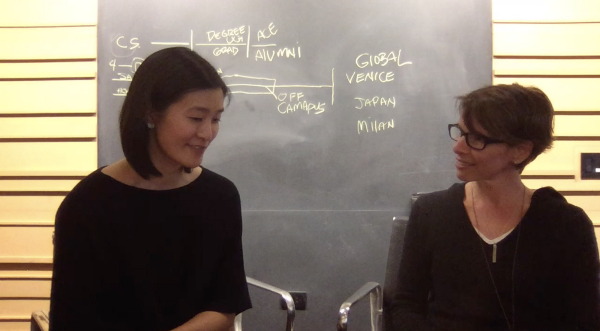
Sara: I try to take a zen approach to it in many cases, but I also believe failure is really important for learning. The zen part is that I really try to … I guess I try to let go of some of the self doubt. I think that it’s inherent in all of us. I think with entrepreneurs, it depends on who you have on your team too. I’ve been in both situations. One they’ll give examples of one for example a board and investor group that was very highly critical and often looking for fault or if something goes wrong, who’s head is going to roll kind of concept, that whole idea.
Then my current investors and board members, when something goes wrong, the first thing they say is “How can we help?” That shift is monumental. Obviously in a successful organization that’s going to push limits or be innovative, you need risk. You need people to feel comfortable taking risk and putting themselves out there sometimes.
However, you don’t want people doing it blindly or without thinking it through, that defensibility, that balancing the strategy, the short and long term risks, the short and long term benefits, etc. I do try to look at it as a long road though. If you have a team, if you can build a team with you, both colleagues and if you have funders who can understand and be there as the longer game, that one failure doesn’t reflect negatively. In fact, pushing yourself outside of your comfort zone can often be a much more beneficial situation in the long run when it’s done occasionally, when you’re not doing it and falling flat on your face every single time. Falling on your face is an important lesson.
Claire: It’s a lesson.
Sara: You learn a ton from it.
Claire: It’s a lesson.
Sara: It makes you more strategic next time and more careful in your due diligence. I view failure as an important part of growth. It’s not something I encourage and I try to set people up for success, but I’m a mom. I have two kids. Oddly it’s the same thing. You want them to have some failure so they learn consequences and learn how to line things up more.
Claire: Absolutely. I was also thinking about, wondering about this idea of trusting yourself and being okay with maybe it not working out and letting go of that is you make the decision. You make the call, but there’s all these other people whether it’s employees, board members, investors, partners who you have to now share, “Okay, we’re going with this. We’re going with the gut decision.”
How do you do that? How do you think about that? I’m curious to know more about your thoughts on that.
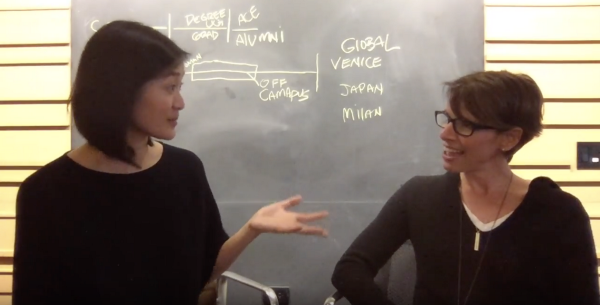
Sara: I think collaboration and engagement within your team is super important. It depends on what we’re doing. I feel as if I try to get my team members to have ownership as well. Our company is a very mission driven company. We help people find jobs. We help people find better situations in their lives. That’s something that from every single person, every single role in our company we can find ownership of. We have researchers who go out and find jobs to add to our site. You can consider that a pretty straight forward, in some ways simple job.
When they’re the one who found that job lead that a job seeker lands that job and we get a success story, that whole, those dots were connected, it is incredibly gratifying. That’s an example. That’s our big mission, but with projects too, I try to get people’s engagement.
We’re working on a really big company project right now that involves engagement and real dedication from different teams. It was my idea. It was my crazy idea to do this, but having people feel they have a voice and have ownership in it as well, and also validating their concerns, really listening, it’s the listening to feedback and constructive criticism and why they think it’s a good idea or bad idea. If they can come around too, you get them on board and they’ll fight more for it. It’s exciting. It generates excitement.
Claire: Definitely. I was curious because I think there’s definitely moments where you make the call and then you’re like, “Okay, are we just going with it?” It’s so much more than that. Like you said, you have to give people ownership and make sure they’re bought in.
Sara: It’s cultural.
You don’t want to be the blind leader. You don’t ever want someone following you and not questioning. I don’t at least. For me, part of our healthy culture is the voices and everyone has a voice in the company that we can work together. While I might lead some things, other people on my team come up with great ideas. Let’s do those too.
You know what I mean?
Claire: Absolutely.
Sara: I might come up with a crappy idea and I need people to tell me this.
Claire: Right. Exactly.
Sara: I have people who will. I appreciate it.
Claire: It’s important. Sara, I would love to also know for those of you who are watching who are either current entrepreneurs, current founders or aspiring entrepreneurs who struggle with this tension of when to listen to one’s gut versus listening to others, what advice do you have for them?
Sara: I think that as an entrepreneur or as you enter this, it’s hard. I think being patient with yourself is really important. It’s not my strength. I will be the first to admit that something I’ve really had to work on. Not just for myself, but probably more so for how I work with my team members, if I were just a solo printer and didn’t have anyone else working for me, it’d be no problem, but I do work with other people. Being able to be patient that way in terms of how you get to ideas and understanding that not everybody gets to a decision place or gets somewhere the same way you do.
Claire: Yes, oh my gosh, that’s so hard.
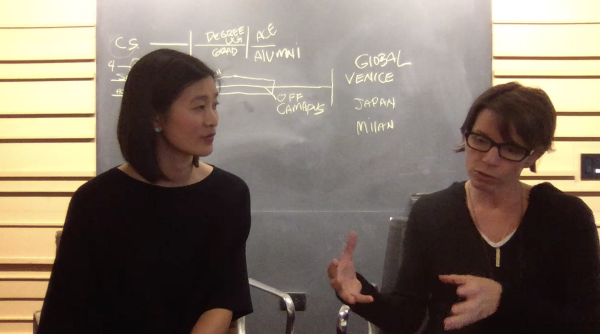
Sara: It’s really hard. There are other times where people are just going to have to run and keep up if that’s the case. You pick you moments.
I think that zen component, I view my business and probably even things in my life a little bit more pink the wash more than I ever used to. I think I took a lot of individual cases very to heart. I still take a lot of pride. Integrity is my number one word in my company. You have to have integrity in every given point, but the pink in the wash concept has helped me with being patient, with realizing that not every single thing has to happen the exact same way I thought it would.
If that means I’m trying to engage somebody to I have my gut and if you’re trying to listen to your gut and you want other people to be listening too, you have to give them a little space sometimes.
I do believe that balancing the logic … My brain works in an art and science way. My gut is probably more on the art side generally. I like to bring in the other side as well. Sometimes I can have an idea and I’m not sure it’s that great, or it’s a gut thing and I’m like, “I’m not sure.” Let me look at the numbers. Let me look at the strategy. Let me look at all of this. That will help me. It’ll help me be like, “Yup, this is a good idea, or nope, that’s not a good idea.” Then other times, you just really have to listen to the voice.
When I started my company and I imagine it’s the same, or both my companies, they’re ideas that I had that I couldn’t get out of my head. I think that is a common story for many people. That’s the kind of gut instinct that I think you shouldn’t try to shut out. I think you have to really listen and explore and vet and give it the due diligence and the attention it’s asking for. There’s a reason for that.
Claire: Definitely. Sara, that idea of patience, patience with not everyone getting what your gut instinct is on something. It’s not going to come out clean. It’s going to be a little messy. A little color is going to rub off on those white sheets or towels or whatever. I so appreciate that reminder. Then also this idea that listening to your gut isn’t one pure channel, but it can be complimented with both art and science like you were saying, backing it up.
Thank you so much for being here, for stopping by from Colorado and sharing some of your wisdom with all of us.
Sara: My pleasure.
Claire: We appreciate it.
Sara: Thank you so much. I appreciate what you’re doing and pulling information from entrepreneurs and helping to share that with other entrepreneurs and business people. I think that trying to pay it forward and not recreate the wheel when you don’t have to, learning form other people’s experiences is really critical. It’s something that I haven’t always had in my career. I think it’s fantastic. Thank you.
Claire: Awesome. Thanks.
